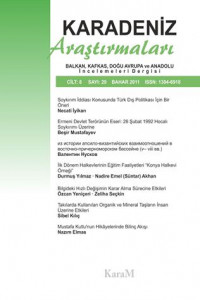Öz
The so-called genocide is one of the primary problems of Turkey in the sphere of foreign policy. In the academic studies regarding the subject, opinions known are generally repeated. The media brings it on its agenda only on April 24 of each year. Turkey’s state discourse does not step out of certain patterns. External actors have determinant roles in the creation of Armenian problem and, in relation to this, the so-called genocide problem as well as its continuity up to the present day. The historical perspective will not be included in this study but the positions taken by the external actors will be reflected in order to be able to comprehend the problem its causes. Today the problem has been influential on the determination of Turkey’s relations with its neighbor Armenia and played the major role in the failure of the protocol signed between the two countries on October 10, 2009 so as to establish relations. The so-called genocide has led to domestic political developments and been a means to receive votes in the elections overseas for many years. The candidates under the influence of Armenian lobbies promised to recognize the genocide if they were elected in the presidential elections, which adversely affected the bilateral relations. When the presidents did not take the step to recognize the so-called genocide in line with the state’s official foreign policy after the elections, it did not mean that the problem came to an end; on the contrary the so-called genocide continued to be recognized in other countries. A recent example of this is Switzerland, which recognized it in December 2010. Turkey has not been able to formulate a productive policy towards the solution of the problem, which led to the result that the number of the countries recognizing the allegations increased. Harsh discourses expressed towards these countries further contributed to the deterioration of bilateral relations. A suggestion has been offered for the solution of the problem in this study. The suggestion has three dimensions. The carrying of state policy from rhetoric to constitutional line underlies this. The purpose of the suggestion is to contribute to the shift of Turkey to an “active / determinative” position and creation of a macro solution for the problem.
Anahtar Kelimeler
Öz
Sözde soykırım konusu Türkiye’nin dış politika alanında yaşadığı en büyük sorunlardan biridir. Konuyla ilgili akademik çalışmalarda bilinen görüşler –genel itibarıyla - tekrar edilmekte; konu basının gündemine ise ancak 24 Nisanlarda gelmekte; Türkiye’nin devlet söylemi ise belli kalıpların dışına çıkmamaktadır. Osmanlı İmparatorluğu’nda Ermeni ve bununla bağlantılı olarak sözde soykırım sorununun oluşmasında, sürekliliğinin sağlanmasında ve günümüz kadar gelmesinde dış aktörlerin belirleyici rolleri vardır. Bu çalışmada sorunun tarihî perspektifi yer almayacak; ancak sorunu ve nedenlerini anlayabilmek için dış aktörlerin aldığı pozisyonlar kısaca dile getirilecektir. Günümüzde sorun, Türkiye’nin komşusu Ermenistan’la ilişkilerin belirlenmesinde etkili olmuş; 10 Ekim 2009 tarihinde, iki ülke arasında diplomatik ilişkilerin kurulmasına dair imzalanan protokolün başarısızlığında da başrolü oynamıştır. Sözde soykırım konusu, uzun yıllardır okyanus ötesinde iç siyasi gelişmelere –özellikle seçimler öncesinde – malzeme olagelmiştir. Ermeni lobilerinin etkisindeki adaylar, başkanlık seçimlerinde seçilmeleri durumunda soykırımı tanıyacaklarına dair söz vermiş; bu da ikili ilişkileri olumsuz etkilemiştir. Başkanların seçimler sonrasında devletin resmî dış politikası gereği sözde soykırımı tanıyacak adımı atmamaları, sorunun bittiği anlamını taşımamış; bilakis sözde soykırımın diğer ülkelerde tanınması devam etmiştir; buna son örnek de 2010 yılı Aralık ayında, sözde soykırımı tanıyan İsviçre’dir. Türkiye, sorunun çözümüne yönelik sonuç alıcı bir siyaset üretememiştir; bu da başta adı geçen iddiayı tanıyan ülkelerin sayısının artmasına; bu ülkelere karşı dile getirilen sert söylem de ikili ilişkilerin bozulmasına neden olmuştur. Bu çalışmada sorunun çözümüne dair bir öneri getirilmiştir. Önerinin üç boyutu vardır. Bunun temelinde devlet siyasetinin retorikten anayasal çizgiye taşınması yatmaktadır. Öneriden amaç; Türkiye’nin soykırım iddiaları konusunda “etken / belirleyici” konumuna geçmesine ve soruna makro boyutta çözüm getirilmesine katkıda bulunmaktır.
Anahtar Kelimeler
Ayrıntılar
| Birincil Dil | Türkçe |
|---|---|
| Bölüm | Araştırma Makaleleri |
| Yazarlar | |
| Yayımlanma Tarihi | 1 Eylül 2011 |
| Yayımlandığı Sayı | Yıl 2011 Cilt: 29 Sayı: 29 |


